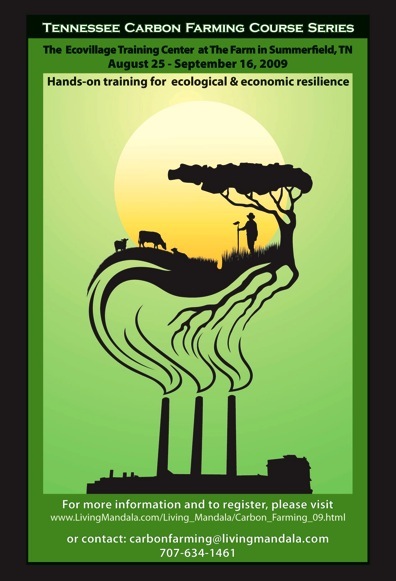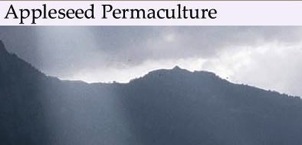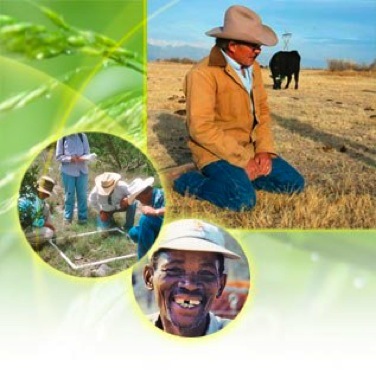Courses, Workshops & Events









Home | About Us | Contact Us | Store

2008, Living Mandala
creative services by: 360 Degrees
Including
HOLISTIC MANAGEMENT
In Association With
Carbon Farming Series
Resource Management Services, LLC
Australia Felix Permaculture
Eco-Village Training Center
Appleseed Permaculture
Facilitators & Instructors
Kirk Gadzia
Context
The Tennessee Carbon Farming Course will be the first in a national campaign to spread this cutting edge curriculum throughout the United States. The Ecovillage Training Center at the Farm offers an amazing opportunity to experience permaculture in action; the Farm's 1,700 acres will undergo a massive keyline design and implementation during and after the course to help drought proof the community and prepare for future growing.
Course Description
Contrary to popular belief, ranching does not have to be damaging to grasslands Ôø‡ in fact, grasslands have co-evolved with grazing animals, and grasses and cattle need each other to thrive.
Using techniques that mimic the way wild herds used to roam across the land, you'll learn how to Ôø‡orchestrateÔø‡ a score that has been playing for eons, putting us in a role as land steward rather than in conflict with the natural world. Even if you're not a rancher, this course will help you to understand ranch management and the integral role cattle and ranchers can play in maintaining healthy ecosystems.
In addition, looking at farm or ranch community as a whole, rather than a series of separate operations or fields, can have surprising and significant results Ôø‡ some holistically managed ranches have seen increases in profits of up to 300%.
This course will walk you through the principles that help bring the abundance and diversity of natural systems to large-scale permaculture systems. Managing land holistically integrates land planning, financial planning, grazing planning and biological monitoring to find ways of being efficient and creative with your resources to achieve the environmental and financial results that make for a sustainable, long-term business.
The course is based on the work of Allen Savory, who pioneered the idea of Holistic Resource Management more than 40 years ago to offer land stewards a way to make grazing, land management and financial decisions that positively impact land health and productivity. More than 30 million acres of land worldwide currently benefit from Holistic Management practices. The course will cover holistic management goal setting, grazing planning, financial planning, and land planning.
Purpose
Studies have shown that permaculture-inspired soil building techniques lead to signficant carbon sequestration, while also increasing soil fertility and water retention. This course will provide participants with an opportunity to learn these techniques in order to create resilient, drought proof, soil-rich, carbon-negative agricultural systems that produce organic food as well as additional income through the international carbon market.
Format
This course is one part of a series of four modules constituting the nation's first holistic curriculum for carbon negative agriculture. Participants can choose to attend the entire course or individual modules and/or combined selections based on their specific interests.
Modules
Module 1 - 8/25-30: Holistic ManagementÔø‡ with Kirk Gadzia
Module 2 - 9/1-6: Keyline Design Course with Darren Doherty
Module 3 - Sep 8-11: Regenerative Earthworks & Food Forestry with Brad Lancaster & Eric Toensmeier
Combined Selections
Holistic Keyline Management: Modules 1-2 - Aug 25-Sep 6
Broadacre Permaculture Design: Modules 2-3 - Sept 1-11
Regenerative Local Agriculture: odules 3-4: Sept 8-16
Holistic Carbon Farming for Soil Health and Increased Profits - All Modules: Aug 25-Sept 16
Site Details
Located on The Farm at the eastern edge of Lewis County Tennessee, ETC is a training center in sustainable living. It holds courses and workshops, apprenticeships and special demonstrations in green lifestyles. The facility is located in a permaculture setting with protected woods and meadows, an eco-hostel, organic garden, swales, ponds and learning center. It hosts courses in permaculture, organic certifications, herbology, installation of solar electric systems, solar waterheating, mushroom cultivation, cob, earthbag and strawbale construction biofuels and a host of courses designed by Gaia University. The ETC has trained students from over 50 countries and is pleased to be working locally with the Hohenwald Financial Permaculture project.
Contact
For questions, more information, and to register,
e-mail: carbonfarming@livingmandala.com or
phone: Living Mandala at: 707-634-1461
Eco-Village Training Center: 931-964-4474
Holistic Management
Broadacre Permaculture & Holistic Management for Carbon Negative Agriculture
Exploring Soil, Water, Carbon, Energy & the Economy through a 6-part holistic curriculum
August 25th- 30th, 2009
with Kirk Gadzia
Ecovillage Training Center at the Farm in Summertown, TN
Will I Benefit from This Course?
You'll benefit from this course if you are looking for another way of managing land that works financially, for the people involved, and for the land.
Many people involved in agriculture are surprised and impressed when introduced to the concept of managing holistically. Typically, everyone can benefit from learning how to make better land management decisions, and everyone involved is a critical part of the decision making.
While the focus of examples and process during the course will definitely be on agriculture, the entire process can be used in the home or any business setting. Since so many farming operations are family businesses, participants can benefit most by including the major decision makers in the course at the same time.
Why Is Holistic Management Important?
Holisitic Management first defines a "whole" to be managed (people, resources and money), and creates what is known as an holistic goal that mirrors these three aspect of the whole. Before implementing projects, any effects on these three aspects must be considered, and the project must simultaneously meet economic standards concerning the viability of the operations.
At present, agriculture and many other businesses are struggling to maintain viabilty. Decreased income often leads to a focus on increased production and harder work. But, if the fundamental decision making process that led to the present situation is not changed, no real progress is likely to be made. Presently, many people involved in agriculture do not realize they are working against "nature's rules" and that their efforts are likely to be unsuccessful until they learn to work with this process. In the end, nature always wins and our production systems must change to be sustainable.
Too often, conventional agriculture focuses almost solely on achieving production goals and solving specific problems, which can create unforseen and unintended consequences that eventually detract from land health, personal and family time and, ultimately, profitability.
Holistic management is effective because the resouce base ultimately supports the financial goals and those of the people involved who depend on the business for their livlihood.
The course teaches participants to define their unique whole, define their unique holistic goal, and to make decisions that are economically, environmentally and socially sound towards that goal. It is a process that works and has a proven track record of more than 20 years.
Tuition & Lodging
This cost of this module is $1,150.
Pricing is $3500 maximum for the entire intensive, August 25 - September 16. Tuition includes over three weeks of instruction, lodging, and 3 delicious meals per day. Participants can register for the entire intensive, individual, or combines sessions. Tuition break-down for individual and combines modules is below. Come for the whole course or pick individual modules & combos.
Module Pricing
Module 1: Aug 25-30 - (6 days) - $1,150
-
Holistic ManagementÔø‡ with Kirk Gadzia
-
Module 2: Sep 1-6 - (6 days) - $1,150
Keyline Design Course with Darren Doherty
Module 3: Sep 8-11 - (4 days) - $800
Regenerative Earthworks & Food Forestry
with Brad Lancaster & Eric Toensmeier
Module 4: Sep 13-16 - (4 days) - $1,400
Soil Food Web & Pathways to Relocalisation
with Dr. Elaine Ingham & Joel Salatin
Combined Selections
All Modules: Ôø‡Holistic Carbon Farming for Soil Health and
Increased Profits" - Aug 25-Sept 16 - $3,500
Modules 1 & 2: "Holistic Keyline Management" - $2,000
Holistic Managment + Keyline Design Course - Aug 25-Sep 6
Modules 2 & 3: "Broadacre Permaculture" - $1,700
Keyline Design Course + Regenerative Earthworks & Food
Forestry - Sept 1-11
Modules 3 & 4: - "Regenerative Local Agriculture" - $2,000
Regenerative Earthworks & Food Forestry +
Soil Food Web & Relocalization - Sept 8-16
Scholarships
Limited scholarships from 25-75% off tuition are now available! To apply e-mail you bio or resume and a short letter why you want a scholarship to: carbonfarming@livingmandala.com
Confirmation
Once we receive your registration information and payment you will receive a confirmation e-mail confirming your registration into the course. We will then send you additional information regarding course details.
Refund Policy
Cancellations are fully refundeable up to two weeks before the course begins on August 11 excluding a $50 processing fee. After August 11 deposits are not refundable and no refunds will be given.
Carbon Farming Blog
Get more information, read postings from instructors, and stay up to date at the Carbon Farming Blog.
Carbon Farming on Twitter


Facilitators & Instructors
Kirk Gadzia
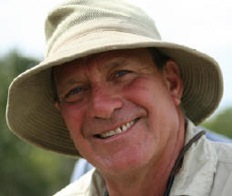
The focus of his work is a holistic approach to agriculture and life, whereby land, animals, crops, wildlife and other resources are planned into the operation and financial picture. The model for making this work is mimicking natural systems and balancing life style with long and short term goal.
Kirk also provides customized training and consulting to a wide variety of public and private business and conservation organizations. Kirk is co-author of the National Academy of Science 1994 publication entitled Rangeland Health, and is working to improve rangeland health monitoring techniques in a wide variety of environments. Kirk has presented talks at the No-till on the Plains Annual Conference in 2003 and 2004, 11th AAPRESID Argentinean No-till Farmers Association Rosario, Argentina in 2003, and The South Dakota No-till Annual Conference in 2007.
Greg Landua

Greg Landua has studied marine and terrestrial ecology and evolutionary biology in the Galapagos Islands, translated for Amazonian rainforest guides, fought wildfires in the wilderness of Alaska, and studied the nuances of ecology and ethics. Greg has B.S. in Environmental Science and Ethics from Oregon State University, and is receiving a graduate diploma in Organizing Learning for Ecosocial Regeneration from Gaia University. He is currently the Program Coordinator for the Ecovillage Training Center on The Farm in Summertown, Tennessee. He is an active permaculture and ecovillage design educator, founding partner of the Nemawashi Partnership, and core member of the Living Mandala Design Collective. Along with teaching and practicing permaculture, Greg is an active bioregional organizer and NextGEN fellow helping to craft avenues and pathways for intergenerational dialog and collaboration in the shared enterprise of earth regeneration. Greg is also a member of the coordination team for the 10th Continental Bioregional Congress, and author of the blog Gaia Emerging which explores regenerative solutions for the well being of our planet.
Ethan Roland
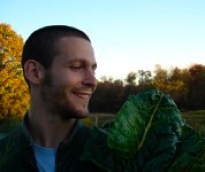
Ethan is a permaculture designer, teacher, and researcher based in the Connecticut and Hudson river valleys. He studies and practices regenerative design in all corners of the world, from the wild apple forests of Kazakhstan to the tropical monsoon ecosystems of Thailand. Ethan builds resilience for local and global communities through the ecological design & development firm AppleSeed Permaculture, and helps to organize the Northeastern Permaculture Network. He holds an M.S. in Collaborative Eco-Social Design from Gaia University, and is currently working for the university in Organizational Development and to grow the Bachelor's program.
Ethan is a joyfully dedicated plant geek, and works closely with Dave Jacke, Eric Toensmeier, and Jonathan Bates on the Board of the Apios Institute to further the art and science of Edible Forest Gardens. He has planted forest gardens all over the northeast, and is eager to share is passion and experience with developing these incredible ecosystems of abundance.
Affiliated Organizations


